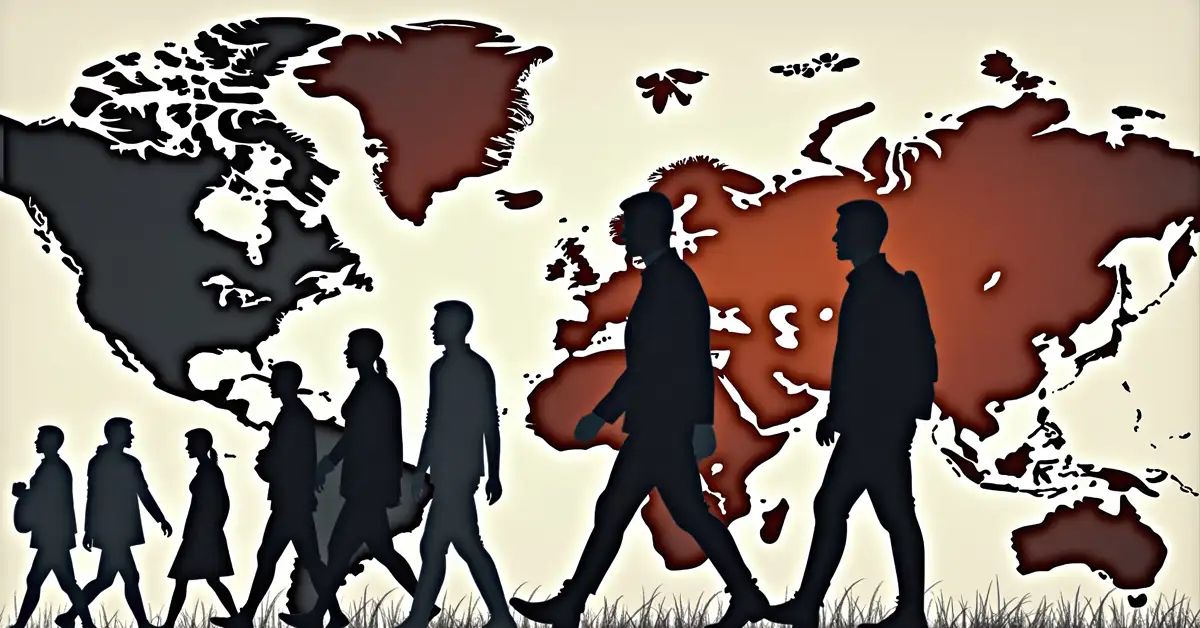Introduction to a Global Journey
Immigration is a transformative journey, driven by dreams of opportunity, safety, or reunion. In 2024 alone, over 281 million people lived outside their country of origin, according to the International Organization for Migration (IOM). Whether fleeing conflict, pursuing education, or seeking economic stability, immigrants face a complex web of visa processes, cultural shifts, and personal challenges. This article explores the realities of immigration, weaving together policy insights, practical guidance, and heartfelt stories from those who’ve walked the path.
Understanding Visa Processes
Securing a visa is often the first hurdle for immigrants. Visa categories vary widely—work, student, family-based, or asylum—each with unique requirements. For instance, the U.S. H-1B visa for skilled workers requires employer sponsorship and a lottery system, with only 85,000 visas issued annually against millions of applicants. In contrast, Canada’s Express Entry system prioritizes points-based criteria like education and language skills, processing over 400,000 permanent residents in 2024.
Step-by-step guidance: Start by researching visa types suited to your goals. Most countries publish eligibility criteria online—check official government websites like USCIS.gov or Canada.ca. Gather documents early, including passports, educational certificates, and proof of funds. Deadlines are critical; missing them can delay applications by months. Consulting a licensed immigration attorney can clarify complex cases, though costs range from $1,000 to $5,000 depending on the region.
“The visa process felt like climbing a mountain blindfolded. I spent months gathering documents, only to learn I needed a certified translation. Patience is everything.” — Maria, a Venezuelan immigrant in Spain
Common Visa Pitfalls
Incomplete applications or misinformation can lead to rejections. For example, the UK’s Skilled Worker visa requires a Certificate of Sponsorship from an employer, and errors in this document are a common cause of denial. Double-check all forms, and avoid unofficial “visa agents” promising guaranteed approvals—scams cost immigrants millions annually. If rejected, many countries allow appeals, but timelines are tight, often 14-28 days.
Policy Landscape and Recent Changes
Immigration policies are shaped by economic needs, political climates, and humanitarian commitments. In 2025, the U.S. tightened border enforcement following debates sparked by incidents like the CSU job listing for border patrol agents, which drew protests from students over ethical concerns, as reported by 9News. Meanwhile, the EU’s Blue Card scheme expanded to attract skilled workers, offering streamlined residency for those earning above €56,000 annually. Australia’s 2024 policy overhaul increased pathways for Pacific Island workers, reflecting regional labor demands.
Key advice: Stay updated on policy shifts. Websites like MigrationPolicy.org or government portals provide reliable updates. Policies can change abruptly—Brexit, for example, ended free movement for EU citizens in the UK, catching many off guard. Subscribing to immigration newsletters or joining expat forums can offer real-time insights.
“I moved to Canada just before they raised the Express Entry points threshold. Checking policy updates daily saved my application.” — Aisha, a Nigerian software engineer
Challenges Immigrants Face
Immigration is rarely a smooth road. Financial strain is a major barrier; relocating costs can exceed $10,000, including visas, flights, and housing. Language barriers also pose challenges—fluency in the host country’s language boosts job prospects by 40%, per a 2023 OECD study. Discrimination is another hurdle; a 2024 UK report found that 1 in 3 immigrants faced workplace bias based on accent or origin.
Overcoming obstacles: Budget carefully and explore scholarships or community grants for relocation costs. Language apps like Duolingo or local classes can bridge gaps. For discrimination, know your rights—many countries, like Canada, have anti-discrimination laws enforceable through labor boards. Joining immigrant support groups provides emotional and practical help.
“I was told my accent made me ‘unprofessional.’ I took free English classes at a community center and practiced daily. Now I’m a team lead.” — Raj, an Indian immigrant in Australia
Emotional and Psychological Toll
Homesickness and isolation are common. A 2024 study by the American Psychological Association found that 60% of immigrants experience “cultural bereavement,” missing traditions or family ties. Therapy, community events, or online expat groups can ease the transition. Self-care is non-negotiable—journaling or mindfulness practices help manage stress.
Success Stories That Inspire
Despite challenges, immigrants often achieve remarkable success. Take Elena, a Syrian refugee who resettled in Germany in 2018. After learning German and completing a nursing apprenticeship, she now works in a Munich hospital, saving lives daily. Or consider Li Wei, a Chinese entrepreneur who moved to the U.S. on an EB-5 investor visa. His tech startup, launched with $1 million in capital, now employs 50 people in California.
Success often stems from resilience and adaptability. Elena credits local mentorship programs, while Li emphasizes networking: “I attended every industry event I could find. Connections opened doors.” Pro tip: Seek mentorship through organizations like Upwardly Global or local chambers of commerce. Persistence pays off.
“I arrived with nothing but hope. Now, I’m training others to chase their dreams.” — Elena, Syrian refugee and nurse in Germany
Cultural Integration and Lifestyle Adjustments
Adapting to a new culture is both exciting and daunting. In Japan, for instance, understanding social norms like bowing or punctuality is crucial for integration. In the U.S., workplace informality can surprise immigrants from hierarchical cultures. A 2024 survey by InterNations found that 65% of expats felt “culturally shocked” in their first year, but learning local customs accelerates belonging.
Practical tips: Observe and ask questions—locals often appreciate curiosity. Join cultural events, like festivals or cooking classes, to build connections. For example, attending a Diwali celebration in London or a Thanksgiving potluck in the U.S. can spark friendships. Language fluency also signals respect; even basic phrases like “thank you” in the local tongue go a long way.
“In Sweden, I learned ‘fika’—coffee breaks—are sacred. Joining colleagues for fika helped me bond and feel at home.” — Fatima, a Pakistani immigrant in Stockholm
Building a Support Network
Community is vital. Immigrant-led organizations, like the Refugee Council in the UK or Welcoming America, offer resources from job boards to legal aid. Online platforms like Meetup host expat gatherings, while faith-based groups provide spiritual support. Don’t isolate yourself—even one connection can lead to a job, friendship, or mentorship.
Legal Guidance for Immigrants
Navigating legal systems is critical. In the U.S., undocumented immigrants face risks, but programs like DACA (Deferred Action for Childhood Arrivals) offer temporary protections for 600,000+ individuals as of 2024. In the EU, asylum seekers must apply within 21 days of arrival in some countries, like Germany, to avoid deportation. Always consult a lawyer for complex cases, especially asylum or family reunification.
Legal tips: Keep records of all interactions with immigration authorities. Free legal aid is available in many countries—check organizations like the UN High Commissioner for Refugees (UNHCR) or local nonprofits. If facing deportation, know your appeal rights; in Canada, the Immigration and Refugee Board handles such cases.
“I didn’t know I qualified for legal aid. A pro bono lawyer helped me win my asylum case.” — Samuel, a Congolese refugee in Ireland
The Path Forward
Immigration is a journey of courage, sacrifice, and hope. From visa applications to cultural adaptation, each step tests resilience but offers rewards. Policies will evolve—2025 may see tighter U.S. borders or expanded EU programs—but the human spirit drives progress. By learning from others’ stories, seeking support, and staying informed, immigrants can thrive in their new homes.
Final advice: Embrace the journey with patience. Connect with others, learn the system, and celebrate small victories. Whether you’re starting anew or helping someone else, every step forward builds a brighter future.

















0 Comments